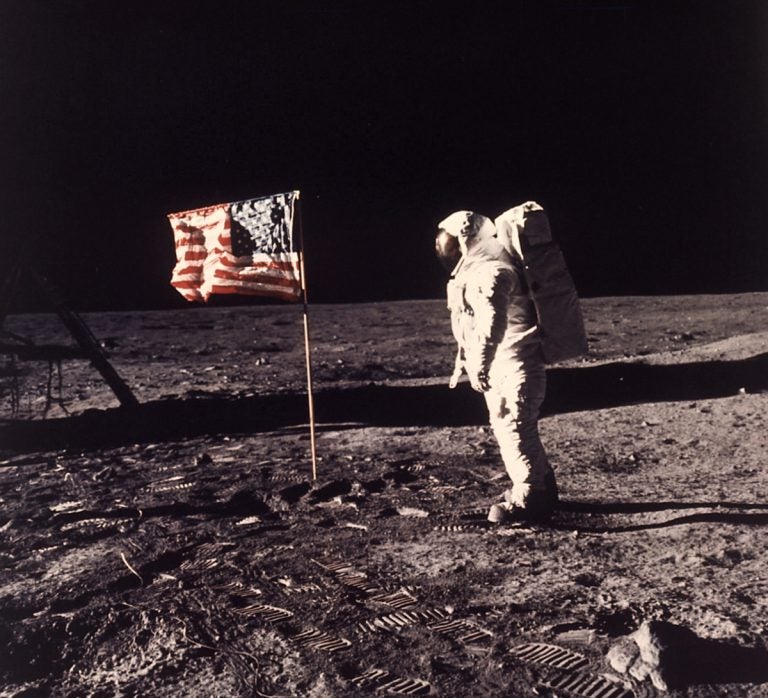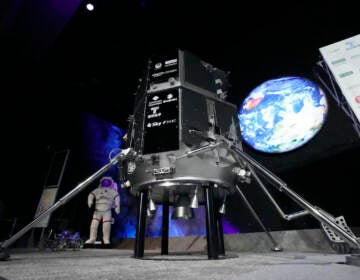Who owns the moon?
If you want to own a plot of lunar land, there are websites that will sell you one. Are those websites for real?
Listen 04:24
Astronaut "Buzz" Aldrin Jr. poses for a photograph beside the U.S. flag deployed on the moon during the Apollo 11 mission on July 20, 1969. (AP Photo/NASA/Neil A. Armstrong)
This story is from The Pulse, a weekly health and science podcast.
Subscribe on Apple Podcasts, Spotify or wherever you get your podcasts.
When Neil Armstrong and Buzz Aldrin landed on the moon 50 years ago, they planted an American flag to show the world that the United States got there first — and beat out the Russians. But that didn’t mean America could lay claim to the moon itself.
So, who owns the moon anyway?
About five years ago, Sam Grubbs of Leicester, England, got a birthday gift from a colleague. It came in a plain, brown cardboard box, but on the front it said, “ One Acre of Land on the Moon.”
Grubbs opened the box, and inside there was a certificate.
“Lunar Deed … this document represents the transfer of one acre of land on the surface of the Earth’s moon from Dennis M. Hope,” Grubbs read.
The land had been sold by a man named Dennis Hope, the alleged owner of the entire moon. And so Grubbs wondered: Who’s Dennis Hope, and how did he become the owner of the moon?
I tracked down Hope’s real estate company. It’s called the Lunar Embassy and says it’s the world’s top seller of land on the moon.
Why does it say that? Well, in 1980, Hope sent a letter to the United Nations, saying he was now the owner of the moon. The U.N. never responded, and so Hope just started selling the land.
Send $24.99 to the Lunar Embassy, and it will send you a certificate for one acre.
Chris Lamar, CEO of Lunar Embassy and acting president of the Galactic Government, said some people have bought a lot more than one acre. They’ve paid over $25,000 for city-sized plots.
Subscribe to The Pulse
“It’s the cheapest property in the whole solar system,” said Lamar.
Cheap? Maybe. But is it fair and legally possible to own a piece of the moon?
“No,” said Claire Finkelstein, a law professor at the University of Pennsylvania who works on international law.
I showed her the Lunar Embassy website, and she was horrified.
“This is a very strange claim,” Finkelstein said. “They can’t be anything but fraudulent.”
Most space-law experts agree. Finkelstein cited Article II of the 1967 Outer Space Treaty.
“Outer space, including the moon and other celestial bodies, is not subject to national appropriation by claim of sovereignty, by means of use or occupation or by any other means.”
Basically, the treaty says space belongs to everyone. It’s a global commons. And because governments can’t control land on the moon, individuals can’t own land on the moon. You need a government to recognize land ownership.
So even if you have lots of certificates from the Lunar Embassy or a similar site, Finkelstein said, those claims will never be recognized.
That should settle the question. Nobody owns the moon.
But Finkelstein said this idea that the moon and space belong to everybody is increasingly in danger. Not from shady real estate companies, but from governments.
“There are serious threats,” she said, “on the part of countries, to appropriate outer space.”
Countries like the U.S. and China are ramping up their interest in the moon and space again, for commercial and for military reasons. If some of those ambitions turn into reality, Finkelstein said, the outer space treaty could collapse.
“It is a concern.”
And if the treaty collapses, lunar land ownership could become a real thing. But that would be done by governments and big corporations, not the Lunar Embassy.
WHYY is your source for fact-based, in-depth journalism and information. As a nonprofit organization, we rely on financial support from readers like you. Please give today.






